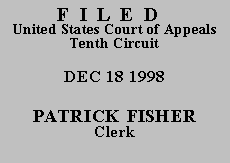

| HORACE BARNES, | |
| Plaintiff -Appellant, | |
| v. | |
| KATHLEEN M. HAWK, Director of the Federal Bureau of Prisons; PATRICK R. KANE and G. L. HERSHBERGER, Directors of Federal Bureau of Prisons, North Central Regional Office; J. W. BOOKER, JR., Warden, U.S. Penitentiary Leavenworth; F. W. APPLE, Warden Operation, U.S. Penitentiary, Leavenworth; PHILLIP K. HILL, Dr., MD, Clinic Director, U.S. Penitentiary, Leavenworth; D. SHEPARD, Hospital Health Service Administrator, U.S. Penitentiary, Leavenworth; and KAREN TODD, Hospital Health Service Assistant Medical PA Administrator, U.S. Penitentiary, Leavenworth, | |
| Defendants -Appellees. |
Proceeding pro se and in forma pauperis, Plaintiff filed a complaint pursuant to 42 U.S.C. § 1983 and Bivens v. Six Unknown Named Agents of Fed. Bureau of Narcotics, 403 U.S. 388 (1971), alleging violations of his rights under the Eighth and First Amendments to the United States Constitution. Plaintiff alleged that Defendants, all of whom are prison officials or medical personnel, were deliberately indifferent to his medical needs to such an extent that they violated the Eighth Amendment prohibition against cruel and unusual punishment. He also argued that Defendants' failure to properly investigate and respond to his administrative grievances amounted to a violation of his First Amendment rights. The district court granted Plaintiff leave to proceed in forma pauperis but dismissed his complaint for failure to state a claim upon which relief can be granted pursuant to 42 U.S.C. § 1997e(c). Plaintiff timely filed a notice of appeal and a motion for leave to proceed in forma pauperis on appeal. The district court subsequently granted Plaintiff leave to proceed in forma pauperis on appeal.
On appeal, Plaintiff asserts that the district court erred in concluding that he did not make out a violation of the Eighth Amendment. He also argues that the district court erroneously failed to conduct a sufficient investigation of the allegations set forth in his complaint, failed to construe his complaint liberally in accordance with his pro se status, and failed to allow him to amend his complaint to correct any shortcomings. We exercise jurisdiction pursuant to 28 U.S.C. § 1291.
This court has not previously set forth the appropriate standard of review for dismissals under 42 U.S.C. § 1997e(c). Generally, we review de novo a Federal Rule of Civil Procedure 12(b)(6) dismissal of a complaint for failure to state a claim. See Riddle v. Mondragon, 83 F.3d 1197, 1201 (10th Cir. 1996). We also have reviewed de novo a dismissal for failure to state a claim pursuant to both 28 U.S.C. § 1915(e)(2)(B)(ii) and Rule 12(b)(6). See Brown v. New Mexico Dist. Court Clerks, 141 F.3d 1184 (10th Cir. 1998) (Table); cf. McGore v. Wrigglesworth, 114 F.3d 601, 604 (6th Cir. 1997) (determining that dismissals under 28 U.S.C. §§ 1915(e)(2) and 1915A should be reviewed de novo). Because we agree with the analysis of our sister circuit in Bazrowx v. Scott, 136 F.3d 1053, 1054 (5th Cir.), cert. denied sub nom. Bazrowx v. Johnson, __ U.S. __, 119 S. Ct. 156 (1998), we conclude that the appropriate standard of review for dismissals pursuant to 42 U.S.C. § 1997e(c) for failure to state a claim is de novo.
After carefully considering Plaintiff's brief and reviewing the record, we agree with the district court's well-reasoned and thorough opinion that Plaintiff has not stated a claim upon which relief can be granted. Plaintiff's allegations that the district court did not give proper credence to his arguments in light of his pro se status do not alter our conclusion. Because Plaintiff is proceeding pro se, we have construed his pleadings liberally. See Haines v. Kerner, 404 U.S. 519, 520-21 (1972); Riddle, 83 F.3d at 1202. Although Plaintiff appears to be capable of presenting his arguments clearly, he has not alleged "sufficient facts on which a recognized legal claim could be based." Hall v. Bellmon, 935 F.2d 1106, 1110 (10th Cir. 1991). Therefore, we AFFIRM for substantially the reasons stated in the district court's Order filed June 18, 1998.
Entered for the Court
Monroe G. McKay
Circuit Judge
*. This order and judgment is not binding precedent, except under the doctrines of law of the case, res judicata, and collateral estoppel. The court generally disfavors the citation of orders and judgments; nevertheless, an order and judgment may be cited under the terms and conditions of 10th Cir. R. 36.3.